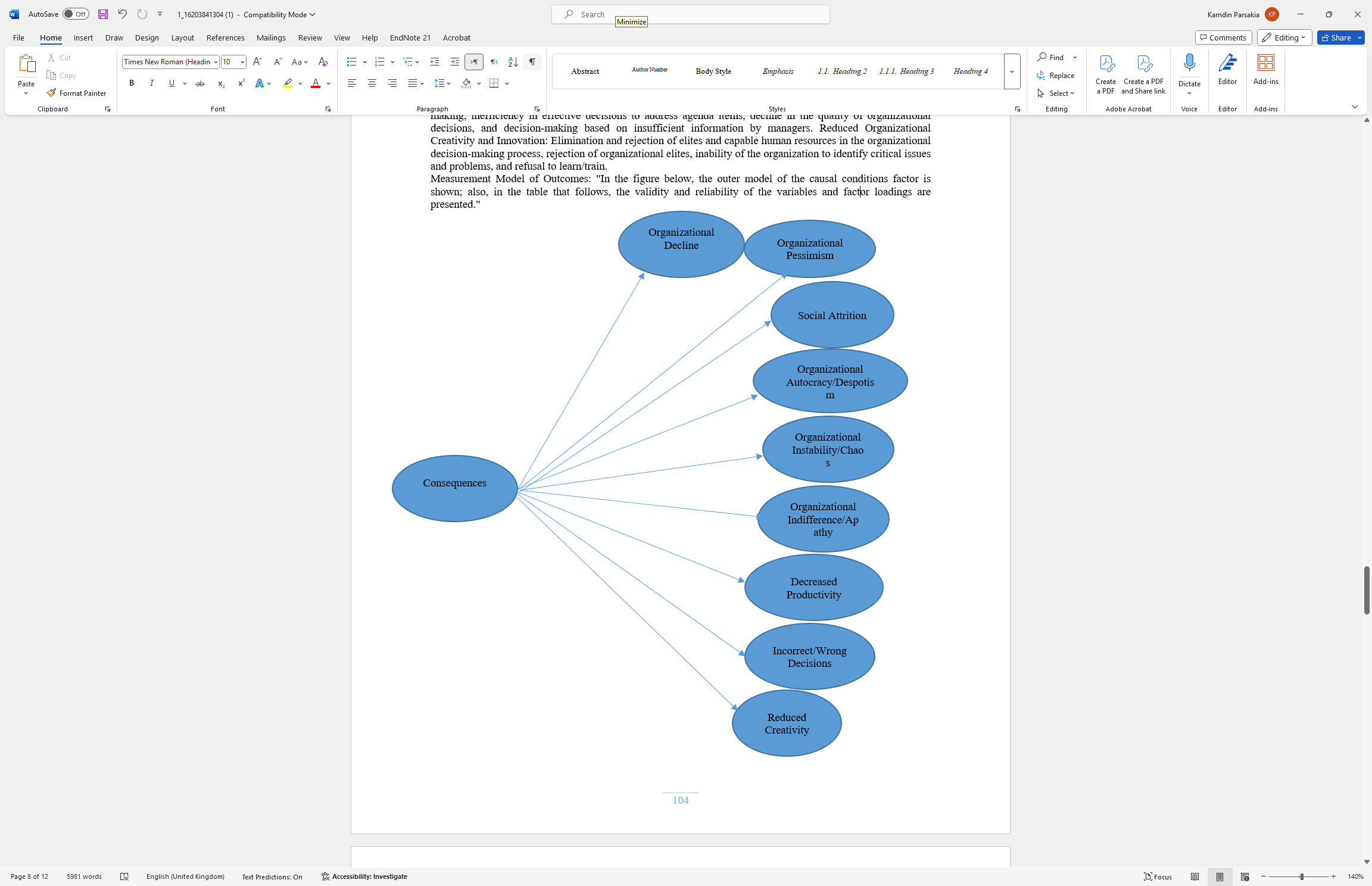Consequences of Pseudo(false) -Participation in Decision-Making by Managers of Iranian Public Organizations
Keywords:
Consequences of participation in decision-making, false participation, decision-making by managersAbstract
False participation in decision-making is a phenomenon that clearly indicates dissatisfaction, inefficiencies, and conflicts in organizations. This fact is especially important in government organizations that have a major responsibility for implementing public services. This research has addressed the conceptual model of false participation in decision-making of managers of Iranian government organizations. The research method is qualitative and based on theme analysis. Semi-structured interviews were used to collect data. The statistical population of this study consisted of experts and experts in the field of human resource management and organizational behavior who could provide valuable information to the researcher. Sampling was carried out using a theoretical method and using purposeful (judgmental) and snowball (chain) techniques, based on which 11 interviews were conducted with experts from government organizations. The results of analyzing the data obtained from the interviews through an open, axial and selective coding process and using Maxqda 2018 software to create a model of the consequences of false participation in managers' decision-making based on thematic analysis, including 49 open codes, 9 concepts and 1 category were extracted. Which includes organizational decline, organizational pessimism, social attrition, organizational tyranny, disorder, inability to participate in non-false, reduced productivity, errors in decisions and reduced organizational creativity and innovation. False participation causes executive decisions in government organizations to be made under the influence of certain interests, instead of based on the opinions and real participation of individuals and groups of stakeholders. This phenomenon not only reduces the effectiveness of decisions and their implementation, but also causes dissatisfaction and disappointment among organizational individuals and society. Originality or value of the article: This article is the first article that has been conducted regarding false participation, especially in government organizations in Iran.
References
C. Biancalana and D. Vittori, "Cyber-Parties' Membership Between Empowerment and Pseudo-participation: The Cases of Podemos and the Five Star Movement," in Digital Parties: Springer, Cham, 2021, pp. 109-126.
V. Palacin, P. Reynolds-Cuellar, M. Nelimarkka, and B. Christoph, "The Design of Pseudo-Participation," in PDC '20: Vol. 2, Manizales, Colombia, 2020, pp. June 15-20, doi: 10.1145/3384772.3385141.
U. Uribetxebarria, A. Garmendia, and U. Elorza, "Does employee participation matter? An empirical study on the effects of participation on well-being and organizational performance," Central European Journal of Operations Research, vol. 29, no. 4, pp. 1397-1425, 2021, doi: 10.1007/s10100-020-00704-7.
T. Y. Chen, "A likelihood-based preference ranking organization method using dual point operators for multiple criteria decision analysis in Pythagorean fuzzy uncertain contexts," Expert Systems with Applications, vol. 176, p. 114881, 2021, doi: 10.1016/j.eswa.2021.114881.
A. Nasiri, Z. Nasiri, and A. Nurolahi, "Examining the effect of managers' supportive behavior on collaborative decision-making with the mediating role of work conscience in sports organizations," An Approach in Business Management, vol. 1, no. 1, pp. 84-96, 2019.
M. Namazi, A. Dehghani-Saadi, and S. Qohestani, "Narcissism of managers and business strategy of companies," Knowledge of Accounting and Management Audit, vol. 6, no. 22, pp. 37-52, 2016.
Y. Zhou, X. Fan, and J. Son, "How and when matter: Exploring the interaction effects of high-performance work systems, employee participation, and human capital on organizational innovation," Human Resource Management, vol. 58, no. 3, pp. 253-268, 2019, doi: 10.1002/hrm.21950.
R. Gholipursoteh and M. Hatami, "Examining the problem of dissatisfaction and the mutual effect of non-participation of employees in organizations and proposing a suitable policy," in The 4th International Conference on Management, Humanities and Behavioral Sciences in Iran and the Islamic World, Tehran (in Persian), 2022.
S. Sethia, "Three Essays on Industry Organization: Improving Industry-level Efficiency while Reducing Undesirable Outputs," University of Connecticut, 2020.
C. Liu, T. Shu, J. Sulaeman, and P. E. Yeung, "Life is too short? Bereaved managers and investment decisions," in Paris December 2019 Finance Meeting EUROFIDAI-ESSEC, 27th Annual Conference on Financial Economics and Accounting Paper, 2022, doi: 10.1093/rof/rfac067.
P. D. N. Zaware, "Deliberating the managerial approach towards employee participation in management," 2020: SSRN, doi: 10.2139/ssrn.3819249.
B. Ziółkowska, "Managers' decisions and strategic actions of enterprises in Poland in the face of digital transformation," Ekonomia i Prawo. Economics and Law, vol. 19, no. 4, pp. 817-825, 2020, doi: 10.12775/EiP.2020.053.
M. Asadi and F. Rahimi, "The relationship between authentic leadership and ignoring anger according to the mediating role of understanding the voice of employees," in The Third National Conference on New Approaches in Education and Research, Mahmoudabad (in Persian), 2017.
A. Khorram Del, "Examining the relationship between the dimensions of organizational commitment and organizational factors affecting employee participation rates," in The Fourth National Conference and the First International Conference on New Models of Management and Business, Tehran (in Persian), 2021.
C. Grund and K. Titz, "Affective commitment through further training: the roles of firm provision and employee participation," Review of Managerial Science, vol. 16, no. 4, pp. 1195-1226, 2022, doi: 10.1007/s11846-021-00460-1.












